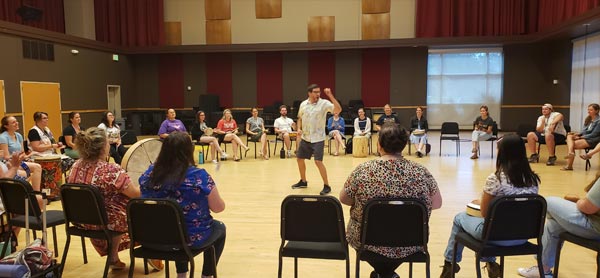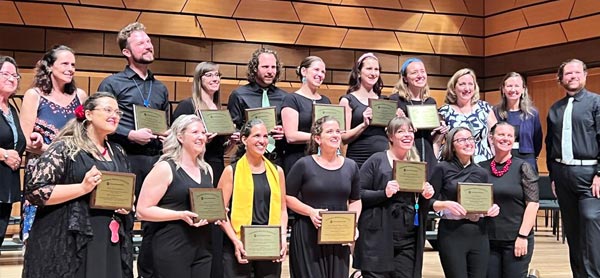


Select one of the options below:
See how earning your master's in Kodály music education can help you to become a more effective music educator. This program allows you to earn your Kodály certification online, with hands-on training in the annual Colorado Kodály Institute.
Take your teaching, conducting, and musicianship to new heights with this unique program that combines an online curriculum with hands-on experience. Designed for elementary, secondary, and independent music educators, this degree features on-campus participation in the annual Colorado Kodály Institute as an exclusive two-week residency each summer.
The online curriculum and summer sessions fit nicely into most teachers' schedules, allowing you to earn your master's in music education while continuing to work full time. The courses you will take online cover theory and research, while the on-campus summer institutes offer important interaction and the opportunity to apply the techniques and methods you have been studying. You will learn from faculty – some with more than 30 years of teaching experience – who are:
Upon completion of this program, you will not only have your master's in music education, but through the summer institute, you will have earned national Kodály music teaching certification as well.
The curriculum introduces the philosophy and teachings of Hungarian music educator Zoltán Kodály, emphasizing concepts like:
The annual Colorado Kodály Institute includes applied course sessions taught by some of the most prestigious music pedagogues from around the country. The two-week summer session gives you the opportunity to apply the theory and research you have learned in your online courses to real-world scenarios by practicing teaching techniques with local elementary students. By bringing together students and respected music educators, the program provides you with real-time feedback to bring your skills to the next level.
See how the skills learned in the program help Alexandria and Kate teach musical concepts with fun and interactive games to inspire their students.
"This program has truly transformed who I am as teacher, musician, and human. It has altered the way I think about music and interact with it. I have also appreciated having the opportunity to return to the student role after being in teacher mode for the past 9 years. I am very appreciative to have had such intelligent and eloquently spoken role models to look up to. I hope I can carry myself with the same deportment that has been demonstrated for me. I certainly feel like a better, more confident, and capable teacher."
Stacey will be graduating with the M.M. in Music Education-Kodaly Emphasis this December. She is from Minatare, Nebraska.
"The instructors are exemplary in their knowledge as well as their fair and consistent feedback. The curriculum is informative and useful, consistently relevant to our teaching positions. You will also form bonds with your fellow educators that will last a lifetime. I cannot recommend this program enough!"
This graduate degree is delivered online and on campus with a residency requirement of three two-week sessions in Fort Collins, Colorado each summer semester. These on-campus sessions include participation in the annual Colorado Kodály Institute as an exclusive two-week residency each summer.
This program gives you the flexibility to get the degree you want without a strict timeline, but still requires the same amount of work and time as an on-campus program. It is recommended that students allow nine to twelve hours per week for a three-credit course. This will vary depending on your learning and studying style.
Your interaction with the faculty and fellow students depends on the specific course. Online courses do provide you with online office hours and email contact. You also collaborate on projects and exchange ideas with fellow classmates through email and discussion board postings.
This program emphasizes a transformative approach to music education with a focus on equity, inclusion, and cultural sensitivity. Examples include:

This program places a strong emphasis on cultivating leadership skills. CSU believes in empowering students to make a significant impact in the field of music education. Examples include:

Equipped with both a Master of Music in Music Education degree and national Kodály teaching certification, graduates of this program have a unique edge in the job market. The skills and knowledge you gain earning these qualifications will help you be a leader in your profession, strengthening an entire school district's music program.
Many graduates go on to share their knowledge with other educators through professional conference presentations, workshops, and publications. Considered an advanced, specialized teacher training, national Kodály teaching certification is a highly sought-after attribute in the profession.
Completion of this unique program can also reveal leadership opportunities throughout regional, state, and national music teaching organizations, such as the Organization of American Kodály Educators, and the National Association for Music Educators.
Applicants must apply and be admitted by both the Graduate School and the School of Music, Theatre and Dance to begin this degree program.
You are required to complete 15 online graduate-level credits in addition to an on-campus summer residency program each summer. During your final semester of coursework, you must successfully complete a written and oral examination before the master's degree is awarded.
The next Kodaly Institute residency program is scheduled to take place July 13–27, 2024.
Through this graduate degree, you will take a variety of courses that cover topics such as pedagogy and folk song literature, folk song analysis and retrieval, conducting, Solfège/musicianship, and choir.
Note: Elective courses vary each semester. You will work with your advisor to choose three credits of approved electives. You may also be required to take additional coursework as determined by diagnostic examinations and/or your graduate advisor.
Earn a national certification in Kodály music teaching during the summer. Designed for elementary and secondary classroom music teachers, ensemble instructors, and independent music instructors, CSU’s Colorado Kodály Institute offers you a depth of knowledge around teaching, conducting, musicianship, and music education.
The Colorado Kodály Institute (CKI) is one of the select programs endorsed by the Organization of American Kodály Educators. CKI faculty are among the top experts in the United States, and the University Center for the Arts location, at the foothills of the Rockies, provides an inspiring setting for personal growth.
Kodály Certification is awarded through Organization of American Kodály Educators (OAKE) when a student has successfully completed all three Levels and can demonstrate expertise in their musicianship, conducting, and Kodály teaching. Upon successfully completing Level 1, students may be promoted to enter Level 2. Upon successfully completing Level 2, students may be promoted to enter Level 3. Promotion is determined on an individual basis by the Institute Faculty and Director according to the standards and guidelines set forth by OAKE.
The majority of participants in this program teach either part- or full-time during the school year, gaining relevant experience while pursuing their certification. As a result, they are continually assimilating real-world teaching experiences into their academic coursework.
Accepted students can take Level 1, Level 2, and Level 3 coursework for credit or noncredit
Want to go further with your music education? Learn more about CSU's online master's in music education program.
Note: The next Kodaly Summer Institute will take place July 2024.
| Fall semester | March 1 |
| Spring semester | November 1 |
| Summer semester | February 1 |
Start your application online and upload materials directly into the online system. You can save your progress and return any time.
Apply NowNote that meeting the minimum department standards does not ensure admission to the program. Admission to Colorado State University graduate programs is based on a number of factors, including prior academic and professional experience and the personal statement.
Prepare the materials below and upload when you apply online.
Complete the online graduate application and pay the nonrefundable application processing fee (payable online). As soon as you have completed the required information, please submit your application. Your application will not be reviewed until it is complete and all required materials have been received.
Request one official transcript of all collegiate work completed from all institutions attended. Transcripts from Colorado State University are not required. Transcripts must be received directly from the originating institution to be considered official.
Please Note: Students may be unconditionally admitted and registered in their first semester of courses with an unofficial transcript. Official transcripts must be submitted, prior to or during your first semester, before you can register for your second semester of graduate work. Failure to meet this condition will result in your dismissal from the Graduate School.
Electronic (preferred): Digital Transcripts must be submitted by the originating institution using a secure service such as parchment, eScrip-Safe, the National Student Clearinghouse, or e-Quals. Transcripts received via emails are considered unofficial. Use institution code 4075 for Colorado State University or gradadmissions@colostate.edu if the secure service requires an email address.
Mail (if necessary) Graduate Admissions Colorado State University – Office of Admissions 1062 Campus Delivery Fort Collins, CO 80523-1062
View your application status at any time to ensure your application checklist is complete or to check on updates.
Once your complete application, including supporting materials, is received, the department admission committee will review your application and notify you of their decision.
Proof of English language proficiency is required for applicants from countries or United States territories where there are official languages other than (or in addition to) English. This includes the U.S. territories of American Samoa, Guam, the Northern Mariana Islands, and Puerto Rico.